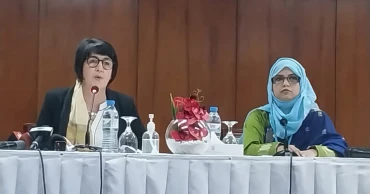UN expert
Bangladesh must suspend pilot project to return Rohingyas to Myanmar: UN expert
Bangladesh must immediately suspend a pilot repatriation project for Rohingya refugees to return to Myanmar, where they "face serious risks" to their lives and liberty, a UN expert said on Thursday (June 8, 2023).
UN Special Rapporteur on the situation of human rights in Myanmar, Tom Andrews, said there were reports that Bangladeshi authorities were using “deceptive and coercive measures” to compel Rohingya refugees to return to Myanmar.
Also read: Rohingyas wanting to return to Myanmar should have access to clear info: UN Deputy High Commissioner for Refugees
“Conditions in Myanmar are anything but conducive for the safe, dignified, sustainable, and voluntary return of Rohingya refugees,” Andrews said.
“Senior General Min Aung Hlaing, who commanded the forces that launched the genocidal attacks against the Rohingya, now leads a brutal military junta that is attacking civilian populations while denying the Rohingya citizenship and other basic rights,” he said.
Bangladesh officials have stated that an initial group of 1,140 Rohingya refugees will be repatriated to Myanmar at an unspecified date and 6,000 will be returned by the end of the year. Actions by Bangladesh authorities suggest that the first return could be imminent.
Aslo read: Myanmar team arrives in Cox's Bazar to verify list of Rohingya for repatriation
“There are also reports of refugees being promised large sums of money, if they agree to return. These promises are allegedly being made even as food rations are being cut to $.27 per person per day for those in the Bangladesh camps. It remains unclear where the funds for repatriated families will come from,” Andrews said.
Under the pilot project, Rohingya refugees will not be allowed to return to their own villages, many of which were razed to the ground during the genocidal attacks of 2017. The refugees would pass through “reception” and “transit” centers in Maungdaw township, after which they would be moved to a designated area of 15 newly constructed “villages” – places they would not be allowed to leave freely.
In March, Bangladesh authorities facilitated two visits by Myanmar junta authorities (SAC) to the Bangladesh camps.
Also read: Dhaka seeks global support in pilot Rohingya repatriation project
Bangladesh and SAC officials also coordinated a “go and see” visit to Rakhine State for some Rohingya refugees. Bangladeshi officials said the refugees had expressed “general satisfaction” with arrangements made for their return, but these assurances were contradicted by reports that those who participated in the trip had unequivocally rejected the repatriation plans.
2 years ago
Languages essential tools to communicate, share knowledge: UN expert
States must be more inclusive in the treatment and use of minority and indigenous languages, the UN Special Rapporteur on minority issues, Fernand de Varennes, said on Monday ahead of International Mother Language Day.
“Languages are essential tools to communicate and share knowledge, memory, and history, but they are also key to full and equal participation,” he said in a statement issued from Geneva.
One of the most effective ways of empowering minorities and indigenous peoples is to guarantee the use of their language in education – particularly as medium of instruction – as long as it is practical, and to provide public services and employment opportunities in these languages, said the UN Special Rapporteur on minority issues.
He said language rights are also important human rights matters for both minorities and indigenous peoples.
“Special Rapporteurs, including my own mandate, have already been critical of the reduction, and in some cases exclusion, of education in minority and indigenous languages which are discriminatory and thinly disguised efforts to assimilate minorities and indigenous peoples.”
Read more: Help us in relocating Rohingyas to Bhasan Char: PM Hasina urges UN
The UN expert said rather than reducing or even eliminating the use of minority and indigenous languages in education, States should invest in the development of teaching materials, the training of teachers and the promotion of mother tongue as a medium of instruction – where feasible – to ensure that minority and indigenous children are provided with the literacy and numeracy skills that will be most useful in learning other languages, including official languages.
“This is the most effective way of guaranteeing equality and non-discrimination with respect to international law,” he said.
In celebrating the richness and beauty of the global linguistic tapestry, it is essential to move away from new forms of nationalist majoritarianism that assume that societies and states should have only one language to the exclusion of all others, said the UN expert.
“This is inconsistent with inclusive societies that are respectful of the human rights of linguistic minorities and indigenous peoples. International Mother Language Day and the International Decade of Indigenous Languages are opportunities to promote and celebrate the world’s linguistic and cultural diversity – and to fully recognise and protect equally the human rights of minorities and indigenous peoples and their languages,” he said.
3 years ago
Bangladesh has 5th highest number of leprosy cases in the world
The situation of persons affected by leprosy in Bangladesh indicates that the country’s outstanding economic growth is not reaching the entire population, a UN expert said today (February 15, 2023).
She called for draft anti-discrimination laws to formally recognise leprosy, also known as Hansen’s disease, as a prohibited ground of discrimination.
“Leprosy is hidden beneath multiple layers of systemic exclusion, structural discrimination and institutional neglect,” UN Special Rapporteur on the elimination of discrimination against persons affected by leprosy and their family members, Alice Cruz, said in a statement at the end of an eight-day visit to Bangladesh.
Bangladesh has the fifth highest number of leprosy cases in the world, according to the World Health Organisation (WHO), with relevant data indicating ongoing transmission, late diagnosis, and gaps in the health system.
Also read: UN leprosy expert to visit Bangladesh
“While I commend the Prime Minister’s commitment to eliminate leprosy by 2030, I am concerned that the state administration is failing to implement this promise,” the UN special rapporteur said.
“Adequate budget allocation with clear targets, indicators and benchmarks is essential to turn the government’s pledges into reality,” Cruz said.
The UN expert expressed deep concerns about a high potential number of hidden leprosy cases, critically delayed diagnosis, ongoing transmission and disability among children and widespread disease-related discrimination and stigmatisation.
She also highlighted limited access to care for those affected – including rehabilitation, reconstructive surgery, assistive devices and psychosocial support.
Also Read: Leprosy still infects 4000 people every year in Bangladesh
Cruz deplored the data gap and limited understanding of leprosy among the relevant authorities.
“Fundamental principles of the right to development, such as equity, self-determination, participation and justice are not being met,” the UN special rapporteur said.
“Persons affected by leprosy and their families are still not enjoying the benefits of economic growth, nor are they seeing discrimination against them duly redressed,” she said.
The expert expressed concerns about reports on corruption with regard to access to disability-related benefits and other social protection schemes, limited efficiency of oversight institutions and essentially paternalistic approaches to people living in vulnerable situations.
Read More: Karkuma Immune Plus boosts type-2 diabetic patients' immunity by 27percent: DU-BIRDEM study
She noted that the government of Bangladesh was committed to actively engaging with the international human rights system to protect the fundamental rights of persons affected by leprosy.
During her visit, Cruz met members of the government, representatives of civil society organisations, healthcare workers, and persons affected by leprosy. She visited healthcare facilities and communities affected by leprosy in Nilphamari and Bogura.
The UN special rapporteur will present her report on the visit to the Human Rights Council in June 2023.
Read More: Bangladesh built fast response capabilities for influenza, other respiratory infection using lessons learned from Covid-19: WHO
3 years ago
UN expert urges Bangladesh to step up efforts to prevent trafficking
UN Special Rapporteur on trafficking in persons Siobhan Mullally has called for greater accountability and said urgent action is necessary to prevent trafficking, and ensure assistance and protection without discrimination.
The UN human rights expert called on Bangladesh to step up efforts to prevent trafficking in persons, especially for purposes of sexual exploitation, child marriage, and forced labour, and urged authorities to improve rights and protection for victims.
“Child trafficking is a significant risk, which must be addressed through expanded child protection and increased efforts at birth registration. No community should be left behind,” the UN expert said.
She met the media at the city hotel on Wednesday afternoon concluding her 10-day visit in Bangladesh.
Read more: COVID-19: US vaccine donations to Bangladesh exceed 100 million
The UN expert urged Bangladesh to step up efforts to prevent trafficking particularly for sexual exploitation of persons of diverse gender identities who were at grave risk.
Mullally met with a range of survivors and victims of trafficking during her visit, including those who had been trafficked for sexual and labour exploitation, domestic servitude, child and forced marriage.
Mullally’s visit took her to Dhaka and Cox’s Bazaar, and to refugee camps hosting almost 1 million Rohingya refugees, and to the city of Sylhet.
She also visited shelter homes for children at risk and victims of trafficking.
“More efforts to combat child trafficking is essential, including by improving rates of birth registration for all communities and ending child marriage. We know that the children of sex workers are at great risk, and are often not registered at birth,” Mullally said.
3 years ago
Migrant workers’ rights: UN expert for monitoring recruitment process
UN Special Rapporteur Siobhan Mullally has sought urgent attention on monitoring situation in countries receiving migrant workers to ensure protection of their rights.
“There is a lot of attention being given to labour migration. We need much more focused attention on ensuring opportunities for women and ensuring protection of their rights as workers,” she told reporters at a press conference held in a Dhaka hotel on Wednesday afternoon.
Read more: Record number of Bangladesh workers left for S Korea Tuesday
Mullally laid emphasis on stronger monitoring in all stages of the recruitment process – who are making job offers, what is happening on arrival, what about their protection and the monetary issues.
The UN expert said absolutely it should not be at the cost of experiencing serious human rights violations.
“More efforts are needed to regulate and hold accountable recruitment agencies and intermediaries who exploit migrant workers in vulnerable situations through high recruitment fees and deceptive job offers,” Mullally said.
Migrant women domestic workers are particularly at risk of trafficking for domestic servitude and suffer horrific abuses due to many gaps in protection and enforcement of workers’ rights, she said.
She said there are steps that can be taken to improve those conditions to expand safe and regular opportunities for women with access to additional training.
The UN expert said receiving countries have obligation under the international laws and it is absolutely critical that women migrant workers continue to have opportunities for employment without discrimination.
Mullally said it is essential that the serious human rights abuses that they see in some recipient countries are addressed.
Particularly with regards to abuses of domestic workers, she said, these are very serious abuses. “Yes, that has been an ongoing priority area of work.”
The UN Special Rapporteur assessed the human rights issue of trafficking in persons during her official visit to Bangladesh from October 31 to November 9, 2022.
Read more: Lucrative Libyan market open again for Bangladeshis, but only 15 agencies running the show
She paid particular attention to the main challenges to ensuring the human rights of victims, and effective prevention of trafficking.
A major concern was the risk of trafficking in the labour migration context, as well as risks faced by refugees, asylum seekers and stateless persons.
Trafficking for purposes of sexual exploitation and concerns in relation to child trafficking for all forms of exploitation were also examined, as will climate-related displacement and increased risks for those directly affected, particularly women and girls in rural areas, and indigenous peoples.
The Special Rapporteur travelled to Cox’s Bazar and Sylhet. She met representatives of government agencies, as well as UN officials, law enforcement bodies, members of civil society organisations and survivors.
The Special Rapporteur will present a comprehensive report of her visit to the UN Human Rights Council in June 2023.
3 years ago
“Bangladesh suffering from greenhouse gas impact caused by the developed world”
UN Special Rapporteur on promotion and protection of human rights in the context of climate change, Ian Fry, is currently on an official visit to Bangladesh.
The special rapporteur’s news conference to share his preliminary findings from the visit will be held virtually on September 15.
This is the first official visit (September 4-15) by the UN expert since he took office on May 1, 2022, said an official.
He is assessing how the adverse impact of climate change affects human rights in vulnerable communities.
Also read: UN acting rights chief for freedom of expression, peaceful assembly in Bangladesh ahead of polls
The special rapporteur is focusing on loss and damages incurred due to climate change and extreme weather.
“The impacts of climate change continue to take a huge economic and social toll on the people of Bangladesh. Studies indicate that globally, costs related to loss and damage from climate change impacts will rise to between $290 billion and $580 billion a year by 2030,” Fry said.
“People of Bangladesh are suffering from the greenhouse gas pollution caused by the developed world. It is time the international community stepped up and took responsibility for these impacts,” the UN expert said.
He is also paying special attention to and exploring how climate change impacts are forcing people to be displaced from their land and what measures are being taken to address these impacts.
The UN expert will identify good practices, strategies and policies implemented by the government of Bangladesh, as the country adapts to climate change and builds resilience to its adverse impacts.
The Special Rapporteur will present a comprehensive report on his visit to the UN Human Rights Council in Geneva in June 2023.
Ian Fry is the first Special Rapporteur on the promotion and protection of human rights in the context of climate change.
He was appointed by the Human Rights Council at its 49th session in March 2022 and started his mandate on May 1, 2022.
Fry is an international environmental law and policy expert.
Also read: UN for adoption, implementation of national strategy for cutting poverty among Bangladesh's differently-abled
His focus has primarily been on mitigation policies, and loss and damage associated with the Paris Agreement, Kyoto Protocol and related instruments.
He worked for the Tuvalu government for over 21 years and was appointed as their Ambassador for Climate Change and Environment from 2015 to 2019.
3 years ago
UN human rights expert on climate change to visit Bangladesh from Sept 4-15
UN Special Rapporteur on the promotion and protection of human rights in the context of climate change, Ian Fry, will visit Bangladesh from September 4 to 15.
This is the first official visit by the UN expert, an international environmental law and policy expert, since he took office on May 1 this year.
During the visit, the UN expert will assess how the adverse impact of climate change affects human rights of communities in vulnerable situations.
The Special Rapporteur will focus on loss and damage incurred due to climate change and extreme weather.
Also read: Bangladesh becomes UNHRC member
He said the impacts of climate change continue to take a huge economic and social toll on the people of Bangladesh.
Studies indicate that globally, costs related to loss and damage from climate change impacts will rise to between $290 billion and $580 billion a year by 2030.
"The people of Bangladesh are suffering from the greenhouse gas pollution caused by the developed world. It is time the international community stepped up and took responsibility for these impacts,” the UN expert said.
He will also pay special attention and explore how climate change impacts are forcing people to be displaced from their land and what measures are being taken to address these impacts.
The UN expert will identify good practices, strategies and policies implemented by the government of Bangladesh, as the country adapts to climate change and builds resilience to its adverse impacts for the full and effective enjoyment of human rights.
Fry will travel to Dhaka, Khulna, and Sylhet to meet with communities affected by climate change.
Also read: Act now on climate front, listen to countries like Bangladesh: Bachelet
He will also meet central and local district government officials, and representatives from civil society.
The Special Rapporteur will present a comprehensive report on his visit to the UN Human Rights Council in Geneva in June 2023.
Fry is the first Special Rapporteur on the promotion and protection of human rights in the context of climate change.
He was appointed by the Human Rights Council at its 49th session in March 2022 and started his mandate on May 1.
3 years ago
Myanmar military killed at least 142 children in past 16 months: UN expert
The Myanmar military junta has brutally killed children and systematically abused their human rights, a UN expert said in a report released on Tuesday, noting that over the past 16 months, the military has killed at least 142 children in Myanmar.
The report called for immediate coordinated action to protect the rights of children and safeguard Myanmar’s future.
Over 250,000 children have been displaced by the military’s attacks and over 1,400 have been arbitrarily detained, said the report received from Geneva.
At least 61 children, including several under three years of age, are reportedly being held as hostages. The UN has documented the torture of 142 children since the coup.
“The international community’s approach to the coup and the junta’s atrocities has failed,” said Tom Andrews, UN Special Rapporteur on the situation of human rights in Myanmar, adding that States must take immediate coordinated action to address an escalating political, economic and humanitarian crisis that is putting Myanmar’s children at risk of becoming a lost generation.
He said the junta’s relentless attacks on children underscore the generals’ depravity and willingness to inflict immense suffering on innocent victims in its attempt to subjugate the people of Myanmar.
The Special Rapporteur said it was clear from the evidence that the children of Myanmar were not only being caught in the crossfire of escalating attacks, but that they were often the targets of the violence.
“During my fact-finding for this report, I received information about children who were beaten, stabbed, burned with cigarettes, and subjected to mock executions, and who had their fingernails and teeth pulled out during lengthy interrogation sessions,” Andrews said.
The junta’s attacks on children constitute crimes against humanity and war crimes, he said, adding that Junta leader Min Aung Hlaing and other architects of the violence in Myanmar must be held accountable for their crimes against children.
READ: War crimes, crimes against humanity committed daily in Myanmar: UN expert
“For the sake of Myanmar’s children, Member States, regional organisations, the Security Council, and other UN entities must respond to the crisis in Myanmar with the same urgency they have responded to the crisis in Ukraine.”
Andrews urged Member States to work in coordination to alleviate the suffering of children by systematically increasing pressure on the junta.
He urged States that have already imposed sanctions on the military and military-linked companies to take stronger coordinated action that will inhibit the junta’s ability to finance atrocities.
“States must pursue stronger targeted economic sanctions and coordinated financial investigations. I urge Member States to commit to a dramatic increase in humanitarian assistance and unequivocal regional support for refugees,” he said.
“It is scandalous that the international community has committed only 10 percent of the funds required to implement the Myanmar Humanitarian Response Plan 2022, causing lifesaving programs for children to be shelved,” he said.
The Special Rapporteur’s report describes the impact of the 1 February 2021 coup on the human rights of children in Myanmar and details the alarming, underreported facts of the violence being perpetrated against them.
Soldiers, police officers and military-backed militias have murdered, abducted, detained and tortured children in a campaign of violence that has touched every corner of the country, the report said.
The junta has intentionally deprived children of their fundamental human rights to health, education and development, with an estimated 7.8 million children out of school.
Following the collapse of the public health system since the coup, the World Health Organization projects that 33,000 children will die preventable deaths in 2022 because they have not received routine immunizations.
Andrews said the lack of action by Security Council was a moral failure with profound repercussions for children in the country.
“World leaders, diplomats and donors should ask themselves why the world is failing to do all that can reasonably be done to bring an end to the suffering of the children of Myanmar,” the expert said.
3 years ago
War crimes, crimes against humanity committed daily in Myanmar: UN expert
War crimes and crimes against humanity are being committed every day with impunity by the military junta of Myanmar, Tom Andrews, the Special Rapporteur on the situation of human rights in Myanmar, told the Human Rights Council in Geneva Monday.
"The people of Myanmar have been told that the world has a 'responsibility to protect,' victims of atrocity crimes, including crimes against humanity and war crimes. As the military junta escalates its ruthless attacks on the people of Myanmar, the people of Myanmar see only endless expressions of concern from the international community, vague declarations that something should be done and a tedious, endless wait for a consensus to act," he said.
"For nearly 14 months, this body [the Human Rights Council] and other UN bodies have held meetings, issued statements and passed non-binding resolutions. Some member states have sanctioned individuals and entities linked to the Myanmar military junta."
For the people of Myanmar, these are welcome but insufficient steps to hold to account those responsible for relentless attacks on them that continue at this very moment, Andrews added.
He pointed to international action in light of the crisis in Ukraine as a standard by which its response to the crisis in Myanmar can be measured:
"Those responsible for the attacks against the people of Ukraine faced severe targeted sanctions personally, and their country's central bank was sanctioned even as foreign currency reserves were frozen," Andrews said.
READ: ICC prosecutor launches Ukraine war crimes investigation
"In the space of four days, the member states of the United Nations summoned the political will to take tangible action."
Andrews said the military junta had murdered more than 1,600 civilians, detained more than 10,000, displaced more than half a million, destroyed more than 4,500 homes since the start of this year, spread armed conflict to regions previously at peace, and continued to systematically oppress and persecute the Rohingyas in Rakhine State.
"It is clear to me that the generals responsible for these escalating horrors are guilty of crimes against humanity, including the crimes of murder, enslavement, displacement and forcible transfer, enforced disappearance, torture, rape and sexual violence," Andrews said.
"I also believe that junta forces have committed war crimes including willful killing, destruction of property, torture and inhumane treatment, pillaging, rape, and displacement of civilians."
In a report to the Council, Andrews highlighted the cost of the junta's attacks on the people of Myanmar: "The military junta has driven Myanmar into a humanitarian catastrophe marked by a crumbling health infrastructure, half the nation falling into poverty, rampant inflation, and the cruel and outrageous blocking of the delivery of aid to those in desperate need."
"Children are being targeted and killed even as they run with their parents for safety. More than 100 have been murdered since the coup was launched last year. More than 100 children are gone, victims of the military junta's ruthlessness, brutality, and cowardice," the UN expert said.
"As members of this Human Rights Council, a body that can serve as the conscience of the United Nations, I hope that most, if not all, of you are horrified and outraged as well."
Andrews added that nearly one million children have missed routine immunisations, which alone could result in the deaths of 33,000 children this year.
He urged the Council and its member states to "stand with and for the people of Myanmar with not only words but even more importantly, with action" as for growing numbers of men, women and children in Myanmar, it is a matter of life and death.
3 years ago
Congo court sentences dozens to death over UN expert murders
A military court in Congo has condemned about 50 people to death nearly five years after the murders of United Nations investigators Michael Sharp and Zaida Catalan in central Congo’s Kasai region.
The President of the Kasai Occidental Military Court, Brig. Gen. Jean-Paulin Ntshayokolo said Saturday that of the 54 defendants, one officer is sentenced to 10 years for violating orders and two others were acquitted.
Those sentenced to death will serve out life sentences, as Congo has observed a moratorium on the death penalty since 2003.
Sharp of the United States and Catalan of Sweden were assassinated on March 12, 2017 in the Kasai Central region while on a field visit with representatives of Kamwina Nsapu, a militia active in Kasai whose customary chief Jean-Pierre Mponde was killed by Congolese army troops in August 2016.
Sharp, the panel’s coordinator and expert on armed groups, and Catalan, a humanitarian expert, embarked on the field visit from Kananga, the provincial capital of Kasai Central, toward the locality of Bunkonde. The two U.N. experts were investigating the violence in Kasai on behalf of the U.N. Security Council. Their bodies were then found in a shallow grave two weeks later.
READ: After suicide bombing, Congo officials fear more attacks
The Congolese government obtained a cellphone video showing them being killed and blame members of the Kamwina Nsapu militia.
Col. Jean de Dieu Mambweni was sentenced to 10 years Saturday of failing to assist a person in danger. No other military leaders were sentenced.
The military court, however, acquitted journalist Trudon Raphaël Kapuku and police officer Honoré Tshimbamba. Both were arrested separately in 2018 and have spent 4 years in prison.
Thomas Fessy, Human Rights Watch’s senior researcher on Congo, said that despite the verdicts, there are still more questions than answers nearly five years after these murders.
“The investigation and ultimately this trial have failed to uncover the full truth about what happened. Congolese authorities, with U.N. support, should now investigate the critical role that senior officials may have played in the murders,” he said via Twitter.
Sweden’s Minister of Foreign Affairs, Ann Linde, also said investigations must continue.
“Crucial that investigation concerning others involved continues to further uncover truth and bring justice. We encourage authorities to fully cooperate with the U.N. mechanism,” she said via Twitter.
4 years ago









.jpg)





